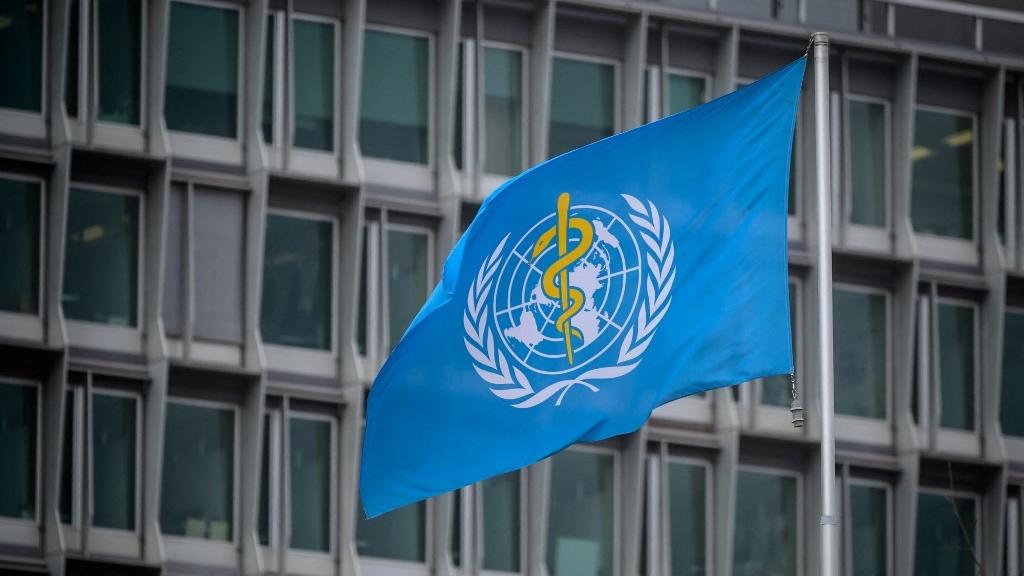 This photograph taken on March 5, 2021 shows the flag of the World Health Organization (WHO) at their headquarters in Geneva amid the COVID-19 outbreak. (FABRICE COFFRINI / AFP)
This photograph taken on March 5, 2021 shows the flag of the World Health Organization (WHO) at their headquarters in Geneva amid the COVID-19 outbreak. (FABRICE COFFRINI / AFP)
LONDON / AMSTERDAM / BERLIN / LISBON / WINDHOEK / YAOUNDE / GABORONE / BRAZZAVILLE / PRAGUE / HELSINKI / SANTIAGO / GENEVA / BUDAPEST / JOHANNESBURG / ROME - Global authorities reacted with alarm on Friday to a new coronavirus variant detected in South Africa, with the EU and Britain among those tightening border controls as researchers sought to find out if the mutation was vaccine-resistant.
Hours after Britain banned flights from South Africa and neighboring countries and asked travelers returning from there to quarantine, the World Health Organization cautioned against hasty measures.
The WHO said it would take weeks to determine how effective vaccines were against the variant, which was first identified this week
One South African scientist expert labeled London’s decision a symptom of "vaccine apartheid", though European Commission chief Ursula von der Leyen said the EU also aimed to halt air travel from the region and several other countries including India, Japan and Israel toughened curbs.
In Washington, top US infectious disease official Anthony Fauci said no decision had been made on a possible US travel ban.
There was no indication that the variant was in the United States, and it was unclear whether it was resistant to current vaccines, he told CNN.
The WHO said it would take weeks to determine how effective vaccines were against the variant, which was first identified this week.
In Geneva the WHO - whose experts on Friday discussed the risks that the variant, called B.1.1.529, presents - warned against travel curbs for now.
British health minister Sajid Javid said the sequence of the variant was first uploaded by Hong Kong from someone traveling from South Africa
"At this point, implementing travel measures is being cautioned against," WHO spokesperson Christian Lindmeier told a UN briefing. "The WHO recommends that countries continue to apply a risk-based and scientific approach when implementing (curbs)."
It would take several weeks to determine the variant's transmissibility and the effectiveness of vaccines against it, Lindmeier said, noting that 100 sequences of it had been reported so far.
British health minister Sajid Javid said the sequence of the variant was first uploaded by Hong Kong from someone travelling from South Africa.
"Further cases have been identified in South Africa and in Botswana, and it is highly likely that it has now spread to other countries," Javid told lawmakers.
One epidemiologist in Hong Kong said it may be too late to tighten travel curbs.
"Most likely this virus is already in other places. And so if we shut the door now, it’s going to be probably too late," said Ben Cowling of the University of Hong Kong.
Richard Lessells, a South Africa-based infectious disease expert involved in detecting variants, also expressed frustration at travel bans, saying the focus should be on getting more people vaccinated in places that have struggled to access sufficient shots.
Belgium
Belgium said it has confirmed one case of a concerning new COVID-19 variant in someone who had traveled from abroad.
Health Minister Frank Vandenbroucke told reporters the variant was detected in an unvaccinated person who tested positive for COVID-19 on Nov 22.
Belgium also Friday ordered a new set of steps to combat the spiraling growth of COVID-19 cases, including closing nightclubs for three weeks and restricting privately organized parties.
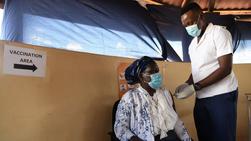 A health worker receives a dose of the Oxford/AstraZeneca COVID-19 vaccine in Francistown, Botswana, on March 26, 2021. (MONIRUL BHUIYAN / AFP)
A health worker receives a dose of the Oxford/AstraZeneca COVID-19 vaccine in Francistown, Botswana, on March 26, 2021. (MONIRUL BHUIYAN / AFP)
Botswana
Health authorities in Botswana announced Thursday that four cases of a new COVID-19 variant now known as B.1.1.529 were reported and recorded on Nov 22 this year.
The four cases were detected among travelers who tested SARS-COV-2 positive on routine pre-travel testing, the Coordinator of Botswana's Presidential COVID-19 Task Force Kereng Masupu said in a statement.
"The variant tests were carried out as part of the routine genomic surveillance of SARS-COV-2, as prescribed in our COVID-19 response plan," said Masupu, adding that the preliminary report revealed that all of the four persons had been fully vaccinated for COVID-19.
Britain
Britain said on Friday that a newly identified coronavirus variant spreading in South Africa was considered by scientists to be the most significant one yet found and so it needed to ascertain whether or not it made vaccines ineffective.
Defending a ban on flights from South Africa, Namibia, Botswana, Zimbabwe, Lesotho and Eswatini, Transport Secretary Grant Shapps said that the lesson of COVID was that early action was essential.
The UK Health Security Agency said that the variant - called B.1.1.529 - has a spike protein that was dramatically different to the one in the original coronavirus that COVID-19 vaccines are based on.
"As scientists have described, (this is) the most significant variant they've encountered to date in their research," Shapps told Sky News.
Officials have advised the government on the need to act swiftly and pre-emptively in case the concerns over the impact of the variant are borne out, even though it could take weeks to generate all the information needed about its characteristics.
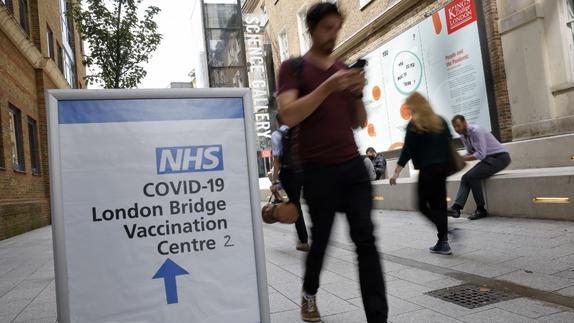 In this file photo taken on Aug 9, 2021,
people pass signs indicating the entrance to the London Bridge Vaccination Center in London. (TOLGA AKMEN / AFP)
In this file photo taken on Aug 9, 2021,
people pass signs indicating the entrance to the London Bridge Vaccination Center in London. (TOLGA AKMEN / AFP)
Separately, COVID-19 vaccination is safe for pregnant women and not associated with higher rates of complications, data released by the UK Health Security Agency showed on Thursday, as officials urged pregnant women to take up the offer of shots.
The real-world data from the rollout of COVID-19 vaccines in Britain support other studies around the world that the vaccines are safe to give at any stage of pregnancy, the UKHSA said.
It found that there were not substantial differences in rates of stillbirths, rates of births of babies with low birthweight and the proportion of premature births between vaccinated women and unvaccinated women.
Officials said the data were especially reassuring given that the first pregnant women to be offered the vaccine were those with underlying health conditions who would be expected to be at a higher risk of complications.
The UKHSA data found that vaccinated women had a stillbirth rate of 3.35 per 1,000, slightly lower than the rate of 3.60 per 1,000 in unvaccinated women.
The proportion of women giving birth prematurely was 6.51 percent for vaccinated people, slightly higher than 5.99 percent for unvaccinated women.
The health ministry said catching COVID-19 came with much bigger risks than having the vaccine, adding that only 22 percent of women who gave birth in August were vaccinated.
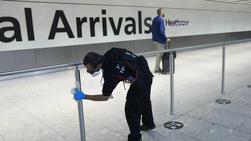 A worker cleans surfaces as a precaution against coronavirus, in the arrivals area of Terminal 5 at Heathrow Airport in London, Aug 2, 2021. (MATT DURHAM / AP)
A worker cleans surfaces as a precaution against coronavirus, in the arrivals area of Terminal 5 at Heathrow Airport in London, Aug 2, 2021. (MATT DURHAM / AP)
In another development, UK authorities will temporarily ban flights from six African countries and place travelers into quarantine over worries about a new, dramatically different COVID-19 variant recently identified there.
ALSO READ: S. Africa detects new virus variant with 'very unusual' mutations
The travel restrictions go into effect at noon Friday and are a precautionary measure to keep the spread of the new variant in check, Health Secretary Sajid Javid said. The six countries will be placed on the UK’s red list, which requires travelers to quarantine in hotels upon arrival in the UK.
Cameroon
The third wave of COVID-19 pandemic is steadily declining and under control in Cameroon, the country's minister of Public Health Manaouda Malachie said on Thursday.
Malachie told reporters after a cabinet meeting in the capital, Yaounde, that the third wave is under control in the central African nation following the significant drop in cases of contamination.
Chile
Chile reported on Thursday more than 2,000 COVID-19 cases, after registering 2,641 infections in the last 24 hours, for a total of 1,751,769 cases, said the Ministry of Health.
There were also 43 COVID-19 deaths reported in the same period, bringing the total to 38,218, the ministry added.
Czech Republic
The Czech Republic reported 27,717 new coronavirus cases for Thursday, the highest daily tally in the country of 10.7 million since the pandemic started, Health Ministry data showed on Friday.
The data showed the epidemic gaining pace with 131,731 cases detected over past seven days, compared to 73,200 cases reported for all of October.
Thursday's tally was the third record count reported in the past seven days.
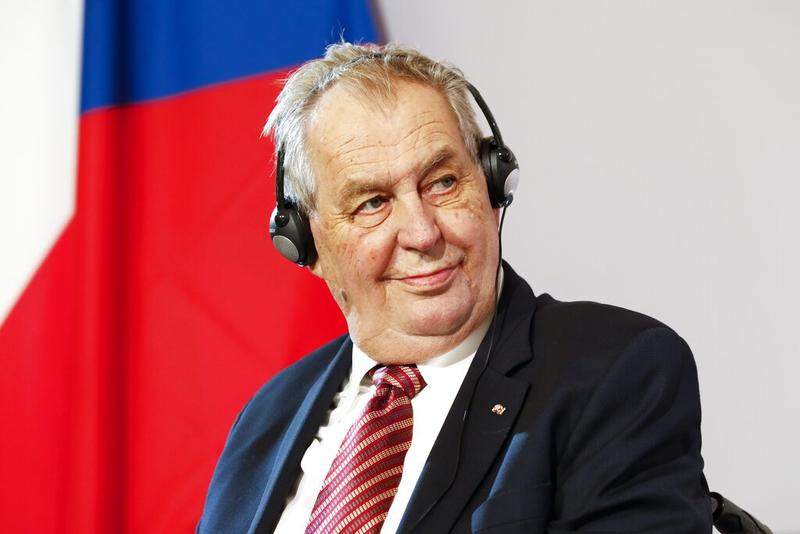 President of the Czech Republic Milos Zeman addresses the media during a joint press conference after their meeting at the Hofburg palace with the Austrian President Alexander Van der Bellen in Vienna, Austria, June 10, 2021. (LISA LEUTNER / FILE / AP)
President of the Czech Republic Milos Zeman addresses the media during a joint press conference after their meeting at the Hofburg palace with the Austrian President Alexander Van der Bellen in Vienna, Austria, June 10, 2021. (LISA LEUTNER / FILE / AP)
Separately, Czech President Milos Zeman has tested positive for COVID-19, his office said on Thursday.
In a short statement, the office said Zeman, who was hospitalized in early October, tested positive in the afternoon and was transported back to the Central Military Hospital in Prague from where he was discharged earlier in the day.
The work program of the president will "be suspended during the treatment of COVID-19," the statement showed.
Meanwhile, the outgoing Czech government tightened social-distancing measures to stem a record spike in COVID-19 infections but refrained from declaring a hard lockdown imposed in neighboring Austria and Slovakia.
The cabinet ordered restaurants, clubs and bars to close at 10 pm and imposed limits for attendance at public events, Health Minister Adam Vojtech said on Thursday.
As some hospitals are already overrun with patients, Vojtech expects new coronavirus cases to continue rising and sees the current wave culminating at around Christmas.
With the vaccination rate of around 60 percent below levels in western Europe, the Czechs have already barred those refusing inoculation from public events and services.
The tighter rules contradict plans of the next cabinet, which is expected to take power in about two weeks and opposes harsh restrictions.
Denmark
Denmark’s parliament agreed on more restrictions to fight a rise in infections. Face masks will again become mandatory on public transport, in retail stores, hospitals and other locations in the health sector.
The Nordic country is expanding the use of virus passports to include smaller public events. The government also decided to shorten the duration that a negative virus test is valid to 72 hours from 96 hours. The changes take effect on Nov 29.
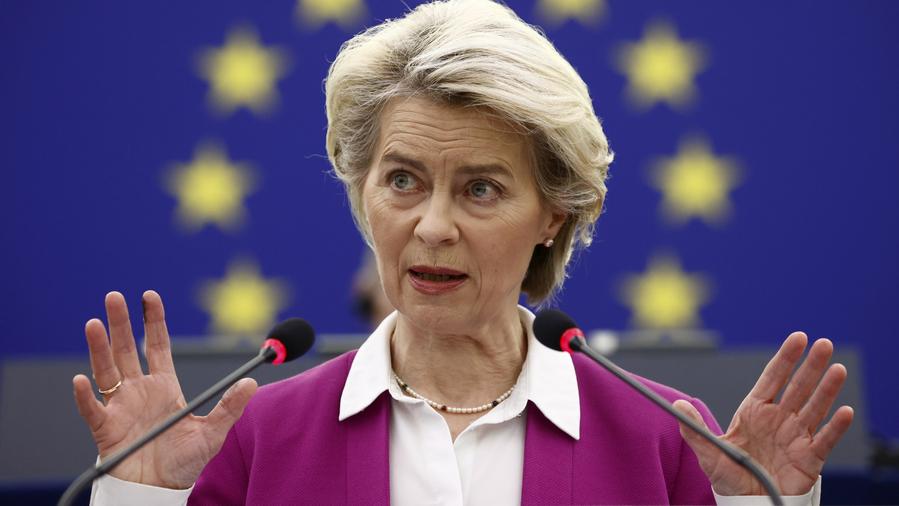 European Commission President Ursula von der Leyen addresses the European Parliament on the conclusions of the October leaders' summit at the European Parliament in Strasbourg, Eastern France, Nov 23, 2021. (CHRISTIAN HARTMANN / POOL PHOTO VIA AP)
European Commission President Ursula von der Leyen addresses the European Parliament on the conclusions of the October leaders' summit at the European Parliament in Strasbourg, Eastern France, Nov 23, 2021. (CHRISTIAN HARTMANN / POOL PHOTO VIA AP)
European Union
The European Union's chief executive called on Friday for a suspension of air travel connection to places where a new coronavirus variant has been detected.
European Commission President Ursula von der Leyen also said vaccine producers are obliged to adapt their jabs as soon as new variants emerge. She spoke as news of a new variant detected in South Africa rattled global markets.
"It is now important that all of us in Europe act very swiftly, decisively and united," she said, in calling for EU citizens to get vaccinated and improve their protection with booster jabs.
"All air travel to these countries should be suspended until we have a clearer understanding about the danger posed by this new variant," she said.
Von der Leyen spoke after Belgium - an EU member country and the headquarters of EU institutions - confirmed a first case of the B.1.1.529 variant on its soil.
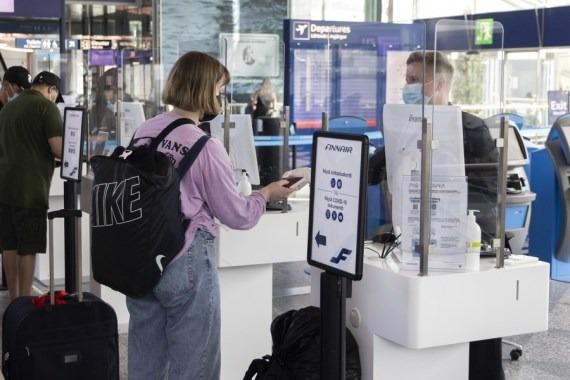 A passenger wearing a face mask checks in at the Helsinki Airport, Finland, on June 21, 2021. (PHOTO / XINHUA)
A passenger wearing a face mask checks in at the Helsinki Airport, Finland, on June 21, 2021. (PHOTO / XINHUA)
Finland
In light of the rapid worsening of the country's COVID-19 situation, several decisions on border health protection measures and restaurant opening hours were taken by the authorities in Finland on Thursday, practically restoring the COVID-19 measures the country had in place in spring 2021.
Over the past two weeks, the incidence rate in Finland has been 237 new coronavirus cases per 100,000 inhabitants, up from 133 recorded in mid-October. Last week alone, 7,200 new cases were reported. The number of patients needing intensive care has nearly tripled over the past three weeks.
Krista Kiuru, minister of family affairs and social services, said at a government press conference that on Thursday there was only a single intensive care unit (ICU) bed vacant for COVID-19 cases. She said that all patients would receive care, but scheduled surgeries would have to be delayed to create ICU capacity.
Finland began relaxing its restrictions in September based on the understanding that an 80 percent vaccination rate would make return to normality possible. However, the virus began to spread among the unvaccinated.
Despite vocal opposition in recent weeks from both the catering industry and the unions, the coalition parties on Thursday decided to cut back restaurant opening hours drastically.
At the press conference, senior government adviser Ismo Tuominen said that the new rules will enter into force this Sunday.
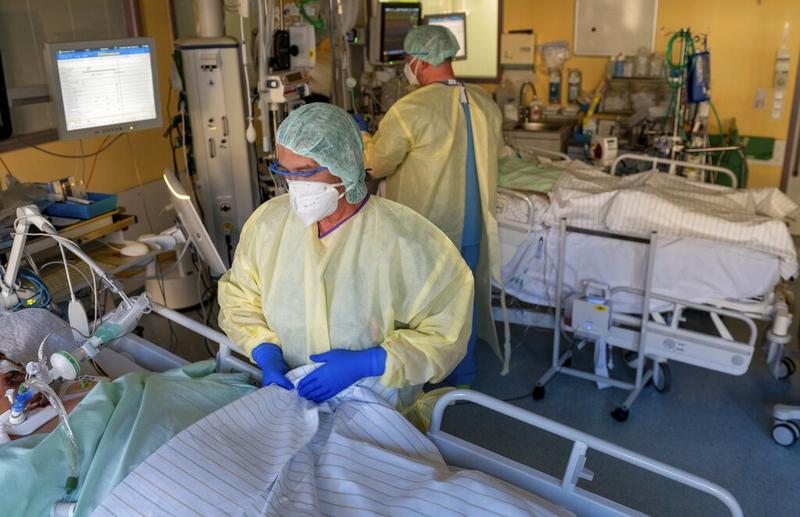 Intensive care nurses treat patients severely ill with COVID-19 in the Corona intensive care unit at the University Hospital in Halle/Saale on Nov 22, 2021. (HENDRIK SCHMIDT / DPA VIA AP)
Intensive care nurses treat patients severely ill with COVID-19 in the Corona intensive care unit at the University Hospital in Halle/Saale on Nov 22, 2021. (HENDRIK SCHMIDT / DPA VIA AP)
Germany
Germany on Friday reported a new record of more than 76,000 COVID-19 infections in a day as its air force got ready for the first time in the pandemic to fly severely ill patients to other parts of the country to unburden struggling hospitals.
The day before, Germany had crossed the threshold of 100,000 COVID-19-related deaths amid warnings from hospitals mainly in the south and the east of the country that their intensive care units are filling to capacity.
Later on Friday, the German air force will transport severely ill COVID-19 patients from the southern town of Memmingen to Muenster near Osnabrueck in the north to relieve clinics in the south, a security source told Reuters.
It is the first time that the air force has to use its so-called "flying intensive care units", planes fitted with up to six ICU beds, to transfer COVID-19 patients within Germany.
Meanwhile, the new coronavirus variant found in South Africa has so far not been identified in Germany or Europe, the head of Germany’s Robert Koch Institute said on Friday, adding that some mutations linked to the variant gave reason for great concern.
“There are other mutations (deriving from the new variant found in South Africa) whose biological composition is unclear. We are in fact very worried,” RKI President Lothar Wieler told journalists in a news conference.
“So far, I am not aware that this variant has been identified in Europe or in Germany.”
Germany will declare South Africa a virus variant area, Health Minister Jens Spahn says in a tweet. Airlines will only transport German residents back to Germany, with 14 days quarantine applying to all returning, including the vaccinated.
"This newly discovered variant worries us. That is why we are acting pro-actively and early here," Health Minister Jens Spahn said. "The last thing we need now is a new variant being introduced that causes even more problems."
 Hungarian Prime Minister Viktor Orban waves after delivering a speech during an event in Budapest on Oct 23, 2021.
(ATTILA KISBENEDEK / AFP)
Hungarian Prime Minister Viktor Orban waves after delivering a speech during an event in Budapest on Oct 23, 2021.
(ATTILA KISBENEDEK / AFP)
Hungary
Hungary needs to increase the number of people taking booster shots against COVID-19 to curb infections, Prime Minister Viktor Orban told state radio on Friday.
Orban said the government would extend a special campaign making vaccinations available without any prior registration to next week following a surge in COVID-19 cases.
He said he would "not exclude anything" but that if the spread of the virus can be curbed with vaccines then there will not be a need for lockdown measures.
Orban said the government would make vaccines available to parents if they want their children aged between 5 and 11 be vaccinated, and has ordered 2 million doses for this purpose, with the first shipment coming next month.
Hungary, a country of 10 million whose vaccination rate lags the European Union average, reported a record 12,637 new daily COVID-19 cases on Wednesday.
Orban's government, which faces elections in April 2022 and opposes further lockdowns for fear of stifling the economy, launched a vaccination campaign this week, offering vaccine shots without prior registration.
Thursday's data showed 5.81 million people, or just under 60 percent of the population, have been fully vaccinated, while 2.15 million have received booster shots.
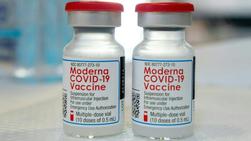 This file photo taken on April 20, 2021 shows Moderna vials on a table at a mobile COVID-19 vaccination clinic in Bridgeport, Connecticut.
This file photo taken on April 20, 2021 shows Moderna vials on a table at a mobile COVID-19 vaccination clinic in Bridgeport, Connecticut.
In another development, the Moderna Inc and Russian Sputnik V COVID-19 vaccines both edged the version from Pfizer Inc and BioNTech SE in effectiveness in a large-scale study of five different immunization shots conducted by Hungarian researchers.
Moderna’s vaccine was 88.7 percent effective in protecting against coronavirus infection and 93.6 percent effective against COVID-19-related mortality, compared with 85.7 percent and 95.4 percent, respectively for Sputnik, according to the paper published Wednesday on the website of the Clinical Microbiology and Infection medical journal.
Pfizer came in third with 83.3 percent and 90.6 percent, respectively.
The research reviewed the effectiveness of five vaccines in people at least seven days after they received their second dose. Data from more than 3.7 million vaccinated people aged 16 and over were reviewed from January to June of this year.
“The wide range of vaccines available in Hungary allows for the assessment of vaccine effectiveness in a real-world setting in a Central European country and puts Hungary in the unique position of providing detailed information on multiple vaccine types from the same country,” the authors, including Hungary’s minister in charge of health-care, Miklos Kasler, and chief medical officer Cecilia Muller, wrote in the study.
Pfizer was administered most frequently, to 1.5 million people, followed by China’s Sinopharm at 895,465, Russia’s Sputnik V at 820,560, AstraZeneca at 304,138 and Moderna at 222,892, according to the study.
AstraZeneca had 71.5 percent effectiveness against infection and 74.5% against COVID-19-related death, while Sinopharm had 68.7 percent effectiveness against infection and 87.8 percent against death.
AstraZeneca had less than 50 percent effectiveness against COVID-19 infection in people aged 85 and older, according to the study.
Ireland
Ireland is set to recommend children avoid indoor gatherings for the next two weeks, state broadcaster RTE reported, as cases rise.
Government advisers say children aged 12 or younger should stay away from events such as school plays and birthday parties, while those as young as eight should wear masks in school and elsewhere.
Until now under 12s have not had to wear face coverings. Nearly a fifth of cases in recent weeks occurred in those aged between five and 12.
Italy
Italy on Friday imposed an entry ban on people who have visited a group of southern African states, including South Africa, in the last 14 days, due to the spread of a new COVID-19 variant there.
Italian Health Minister Roberto Speranza signed an executive order banning entry from South Africa, Lesotho, Botswana, Zimbabwe, Mozambique, Namibia and Eswatini, a statement said.
“Our scientists are studying the new B.1.1.529 variant. In the meantime, we will adopt the greatest possible caution,” Speranza said.
Namibia
Namibian health authorities on Thursday said that only COVID-19 certificates obtained on the Trusted Travel platform or verified on the Global Haven system will be valid for exit from or entry into Namibia at all points of entry as of Jan. 15, 2022.
The Trusted Travel Platform was officially launched in Namibia on Nov. 8, for verification and authentication of COVID-19 test results.
Namibia's Health and Social Services Ministry Executive Director, Ben Nangombe said that the transition period for the Trusted Travel Platform has been extended from Dec 1, 2021, to Jan 15, 2022, to allow for a smooth transition, especially given many anticipated travels during the festive season.
Netherlands
The Dutch government said on Friday it will halt air traffic from Southern Africa starting at noon, following the detection of a new coronavirus variant there.
Health Minister Hugo de Jonge said in a statement the ban would apply to all countries in Southern Africa, and that travelers currently en route would be required to quarantine upon arrival at Schiphol Airport.
Meanwhile, the government plans a set of "heavy measures" to slow the current record wave of new COVID-19 cases the country is facing, health minister Hugo de Jonge said on Thursday, but it has not made a final decision on what they will be.
"That heavy measures will be needed is beyond doubt," De Jonge told reporters in The Hague after health authorities reported more than 20,000 new cases in the past 24 hours. The government is expected to announce new restrictions on Friday.
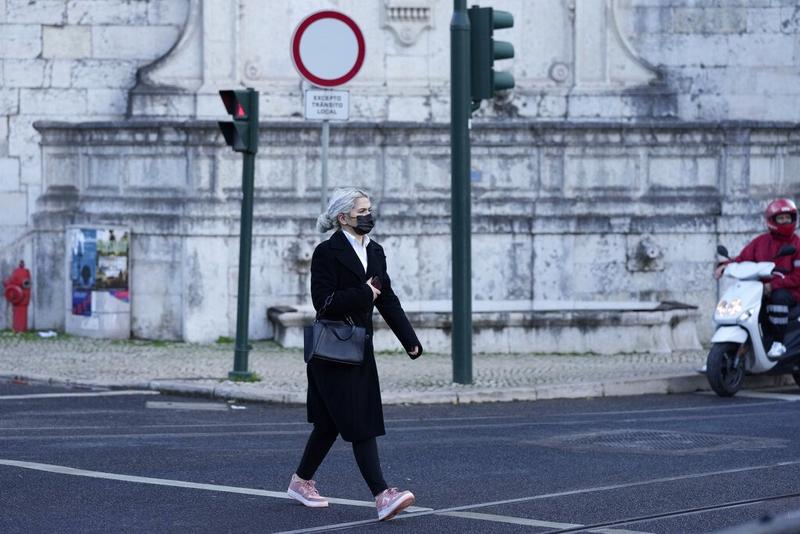 A woman wearing a face mask crosses a street in Lisbon on Nov 25, 2021. (ARMANDO FRANCA / AP)
A woman wearing a face mask crosses a street in Lisbon on Nov 25, 2021. (ARMANDO FRANCA / AP)
Portugal
Portugal, which has one of the world's highest rates of vaccination against COVID-19, announced it would reimpose restrictions to stop a surge in cases, ordering all passengers flying into the country to show a negative test certificate on arrival.
Portugal reported 3,773 new cases on Wednesday, the highest daily figure in four months, before dropping to 3,150 on Thursday.
Deaths, however, remain far below levels seen in January, when the country faced its toughest battle against COVID-19.
Around 87 percent of Portugal's population of just over 10 million is fully inoculated against the coronavirus and the country's speedy vaccination rollout has been widely praised. That has allowed it to lift most of its pandemic restrictions.
But, as another wave of the pandemic sweeps across Europe, the government reintroduced some old rules and announced new ones to limit the spread in the run-up to the holiday season. The measures come into force next Wednesday, Dec 1.
Prime Minister Antonio Costa announced on Thursday that those fully vaccinated must also present proof of a negative coronavirus test to enter nightclubs, bars, large events and care homes, and that the EU digital certificate would be required to stay in hotels, go to the gym, or dine indoors in restaurants.
Those sitting outdoors will not need to show the digital certificate.
Remote work, which is now recommended where possible, will be mandatory during the first week of January and students will return to school a week later than usual to control the spread of the virus after the holiday festivities.
Costa said Portugal must continue to bet on vaccination to control the pandemic. Health authorities hope to give COVID-19 booster shots to a quarter of the country's population by the end of January.
South Africa
South Africa said on Friday a British ban on flights from six southern African countries over a new COVID-19 variant seemed rushed, as EU authorities prepared similar moves and the World Health Organization convened an emergency meeting.
South Africa will speak to British authorities to try to get them to reconsider their ban, the foreign ministry in Pretoria said.
"Our immediate concern is the damage that this decision will cause to both the tourism industries and businesses of both countries," Foreign Minister Naledi Pandor said in a statement.
South Africa - the worst affected in Africa in terms of total reported COVID cases and deaths - had been experiencing a lull after a severe third wave of infections, until last week when new infections started to pick up.
On Thursday, the National Institute for Communicable Diseases (NICD) reported 2,465 new cases, almost double the previous day's number. Although the NICD did not link the resurgence to the B.1.1.529 variant, leading local scientists suspect it is the cause.
The Africa Centres for Disease Control and Prevention strongly discouraged travel bans on countries that had reported the variant. "Imposing bans on travelers from countries where a new variant is reported has not yielded a meaningful outcome," it said.


